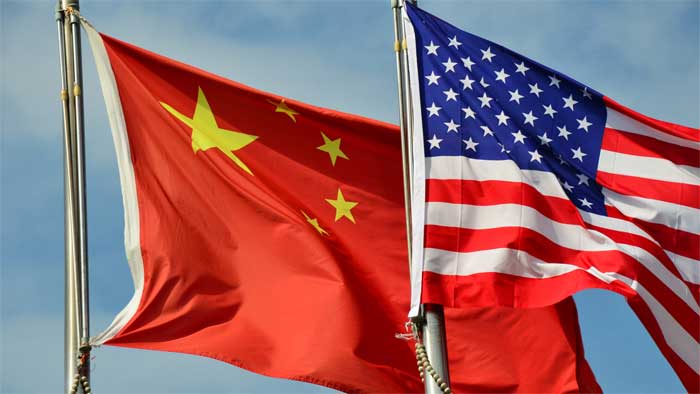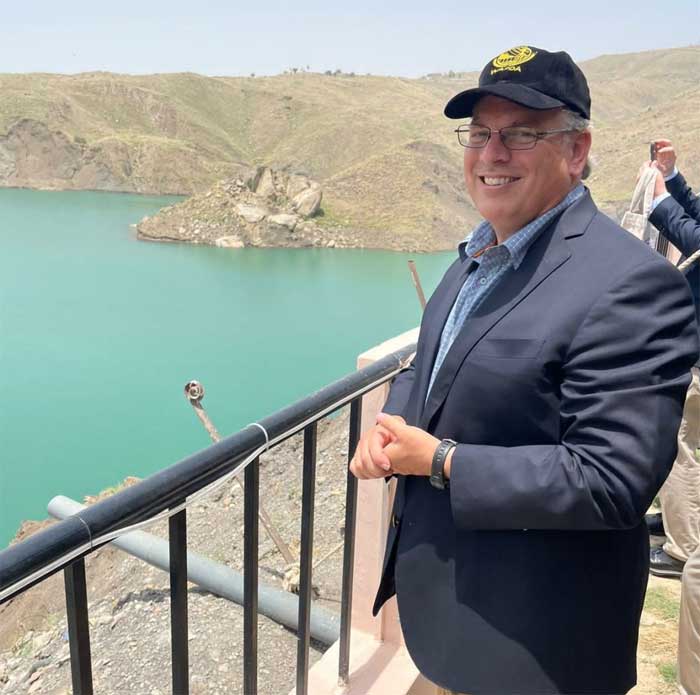I hope that through this visit, Mr. Secretary, you will make more positive contributions to stabilizing China-US relations,” Xi told the US diplomat in Beijing on Monday, according to a Chinese Foreign Ministry statement. “The two sides have also made progress and reached agreements on some specific issues. This is very good,” he said in a video clip of the meeting posted by state broadcaster China Central Television, without elaborating. The yuan pared a drop of as much as 0.52% to trade 0.42% weaker at 7.1556 a dollar on Monday afternoon, as the two politicians met. Chinese Foreign Ministry spokeswoman Hua Chunying attended the meeting, along with other senior officials including US Ambassador to China Nicholas Burns and Chinese Foreign Minister Qin Gang. The positive tone emerging from Blinken’s high-stakes visit to Beijing will raise expectations the bilateral relationship can reach a more stable footing, as US allies and some of China’s largest trading partners get caught in the cross-fire of ruptured ties. China also has reasons to cool ties. Beijing is facing an increasingly challenging geopolitical landscape, as the US blocks China’s access to high-tech chips over concerns of its military aggression toward Taiwan and puts pressure on Xi to condemn Putin’s invasion of Ukraine.Blinken’s meeting with Xi also lays the groundwork for in-person Xi-Biden talks later this year. On Sunday, Qin accepted an invitation to visit Washington, the State Department said, after 7 1/2 hours of talks that both sides described as “productive” and “candid.”
Top US diplomat meets China’s FM in Beijing during the highest-level official visit in five years.US Secretary of State Antony Blinken has held “candid, substantive, and constructive” talks with Chinese Foreign Minister Qin Gang in Beijing, the US Department of State says. Sunday’s talks marked the start of the highest-level trip by a US official to China in nearly five years as the rival superpowers aim to stabilize hard relations. The secretary emphasized the importance of diplomacy and maintaining open channels of communication across the full range of issues to reduce the risk of misperception and miscalculation,” State Department spokesperson Matthew Miller said. China is committed to building a “stable, predictable, and constructive” relationship with the United States, state media reported. He also made clear China’s concerns regarding its core interests – including the Taiwan issue, describing it as the “most prominent risk” in Sino-US relation. Before the talks, US officials saw little chance of any breakthrough on the long list of disputes between the world’s two largest economies, which range from trade and US efforts to hold back China’s semiconductor industry, to the status of self-governed Taiwan and Beijing’s human rights record.”The secretary raised a number of issues of concern, as well as opportunities to explore cooperation on shared transnational issues … where our interests align,” Miller said. Blinken invited Qin to visit Washington, DC “to continue the discussions, and they agreed to schedule a reciprocal visit at a mutually suitable time”, he noted. The top American diplomat’s two-day trip comes amid frosty bilateral ties and follows the discovery of a suspected spy balloon above the US in February that prompted him to delay the trip planned the same month. With China and the US at odds on an array of issues from trade to technology and regional security, both countries have voiced guarded hopes of improving communication. University of Sydney said the US has a lot to do to repair relations with China, including “a lot more lines of communication being opened up”. “Diplomacy is desperately needed at the moment and the visit itself is a good thing by Antony Blinken. But I don’t think it’s going to soften relations dramatically. Blinken, the highest-level American official to visit China since President Joe Biden took office, will have more senior level contacts with the Chinese on Monday, including potentially with Chinese leader Xi Jinping.
Biden said he hoped to again meet Xi after a lengthy meeting in November on the sidelines of a Group of 20 (G20) summit in Bali, where the two agreed on Blinken’s visit.
“I’m hoping that, over the next several months, I’ll be meeting with [Chinese President] Xi [Jinping] again and talking about legitimate differences we have but also how there’s areas we can get along,” Biden said. The two leaders are likely to attend the next G20 summit, in September in New Delhi, and Xi has been invited to travel to San Francisco in November when the US hosts leaders from the Asia-Pacific Economic Cooperation (APEC) grouping. A recent phone call between Blinken and Qin underlined the heightened tensions between the two sides. “Beijing is looking for assurances from the US that it won’t meddle into its domestic affairs, that it won’t cross the red lines of its core interests, particularly Taiwan,” said Al Jazeera’s Katrina Yu, reporting from the Chinese capital.
But expectations of any major breakthroughs from the visit are low, Yu added. “But that doesn’t mean that it is not significant, especially as China’s neighbours are very worried that the relationship has gone so bad that there is a danger of tensions spiraling out of control into some sort of open conflict,” Yu said. Ties between Beijing and Washington have deteriorated across the board, raising the specter that the two might one day clash militarily over the self-ruled island of Taiwan, which China claims as its own. They are also at odds over issues ranging from trade, US efforts to hold back China’s semiconductor industry and Beijing’s human rights track record. Specifically alarming for China’s neighbours has been its reluctance to engage in regular military-to-military talks with Washington, despite repeated attempts for dialogue by the US.
Speaking at a press conference on Friday before he left for Beijing, Blinken said his trip had three main objectives: Setting up mechanisms for crisis management, advancing the US’s and its allies’ interests as well as speaking directly about related concerns, and exploring areas of potential cooperation.”If we want to make sure, as we do, that the competition that we have with China doesn’t cover into conflict, the place you start is with communicating,” Blinken said. The US has also been keeping its allies close, with Blinken speaking by telephone with his counterparts from Japan and South Korea during his 20-hour journey across the Pacific.Biden’s national security adviser, Jake Sullivan, also travelled to Tokyo for separate three-way meetings involving Japan, South Korea and the Philippines. In recent months, the US has reached deals on troop deployments in southern Japan and the northern Philippines, both strategically close to Taiwan. Blinken is the first top US diplomat to visit Beijing since a stop in 2018 by his predecessor Mike Pompeo, who later championed no-holds-barred confrontation with China in the final years of Donald Trump’s US presidency.
Very good progress made: China FM




